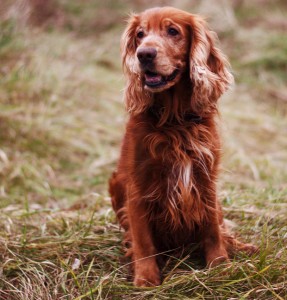Stage 5 in dog training is all about maintaining your training standards
This last stage in dog training is important, but happily it rarely causes serious problems
Let’s face it, anyone that has got through Stage 4 – ‘proofing’, in all its glory, is going to be well motivated not to lose what they have achieved.
However, it is not unusual for us to find an older dog becoming just a little sloppy in his manners. He sits a little slower than he used to, takes a little more time to return on the recall, and so on.
So let’s take a look at why that might be.
Fading rewards too fast
We tend to be in a hurry to move away from rewards, especially food rewards. This can lead to fading rewards too fast and too far.
 Studies show that a reinforcement rate of less than 50% may lead to behaviours becoming unstable.
Studies show that a reinforcement rate of less than 50% may lead to behaviours becoming unstable.
With my own dogs I have found I can get down to rewarding around 25% of behaviours without losing the quality of their responses, but my dogs are gundogs, and have been bred to be particularly co-operative.
They are also doing a job that they love so much of what they do, is intrinsically rewarding.
If you are asking your dog to do a lot of tasks that he might not really enjoy – calling him away from other dogs in the park for example, then you are going to need a reinforcement rate that is a bit higher than mine.
If your dog is from a less naturally co-operative breed, one of the hounds for example, you may find you need well over 50% of responses to be reinforced to maintain a high standard of behaviour.
Try not to fight this. Your dog is what he is. And an obedient dog is well worth the effort of settling on the kind of reward schedule that your own dog needs
Forgetting rewards altogether
It is very easy for us to get a bit forgetful when it comes to rewarding our dogs, especially when the dog is pretty well behaved on the whole.
“Sit” we say, knowing that the dog will sit and turning away to chat to our friends. It is fine to do this sometimes. But it is easy to slip into doing it over and over again.
Before we know it, we have asked the dog to sit, twenty times or more, and given him no reinforcement at all for his obedience.
Gradually, as the months slip by, the obedient dog then becomes increasingly disobedient.
Remember that dogs and all other mammals only repeatedly carry out behaviours that are beneficial to them in some way.
Dog do what works
Nature has designed an excellent system to ensure that animals do not expend valuable energy, or take risks by carrying out activities that do not benefit them.
Without such a system none of us would survive, so it is genetically coded into us all.
Dogs do what works. Make sure what you want your dog to do, benefits him in some way or another, or he will eventually stop doing it.
Switching to rewards not valued by the dog
Another way in which we sometimes lose our hard earned trained behaviours, is by switching to rewards not valued by the dog. This is again linked up with our aversion to using food in dog training.
Many of us are keen to switch to a non-food reward. This is fine if the non-food reward is something that the dog enjoys. As mentioned earlier, gundog training is a good example of you a dog can be rewarded through the activity itself.
If you train a gundog to retrieve game, you don’t need to keep rewarding the dog for doing so. The dog finds that act itself intrinsically pleasurable.
However, with some dogs, you may well need to provide an incentive to keep a dog retrieving artificial items like dummies, dumbbells or balls. It depends on the dog.
What does your dog like?
You may have a spaniel who will move heaven on earth for you in exchange for catching a ball. Whilst your friend’s beagle will only catch balls in exchange for chicken.
A large part of successful dog training, and maintaining high standards over the long run, lies in choosing appropriate rewards.
Ask yourself “What does my dog really like”
For many dogs, for most of the time, these rewards are food, food and more food.
Don’t try and switch to a ‘pat’ and some praise unless your dog really and truly values this kind of approval. I have two cocker spaniels that would sell their souls for a cuddle, but truth is, most dogs would not. And yours probably won’t either.
Work with the dog you have, not with the dog you wish you had.
Summary
Make being an obedient dog a pleasure. Don’t ask your dog to sell his soul for no reward. Keep your reward schedule high enough to maintain your dog’s good behaviours.
Don’t be tempted to switch to rewards that have no value for your dog, be brutally honest with yourself when assessing whether or not a kind word from you is really worth your dog leaving his playmates for.
Make working for you, and with you, a worthwhile endeavour for your dog, and all those hours and months of training will not be for nothing.
